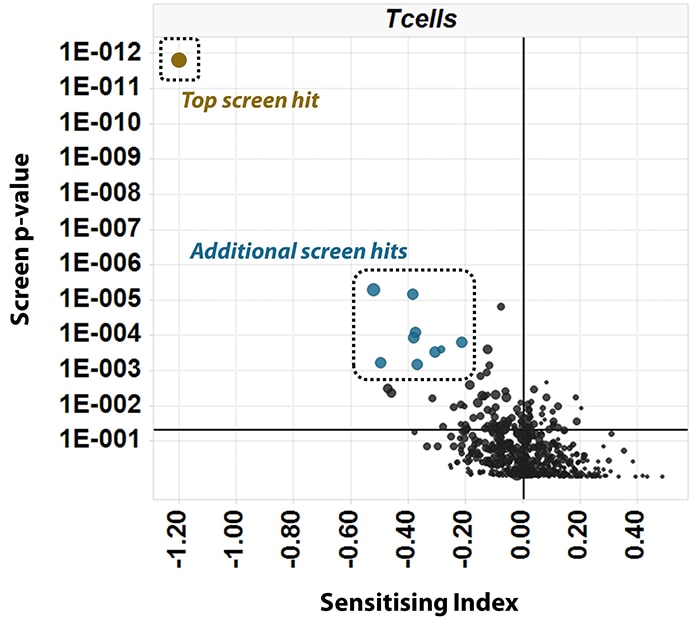Demonstration of a repeatable pooled lentiviral sgRNA screen in primary human T cells
The advent of CRISPR technologies and the use of T cells in personalized medicine have greatly accelerated both the therapeutic value of and interest in modified T cells. Genetic screens are an incredibly valuable tool to find and validate novel biology, drug targets and mechanisms of drug resistance or sensitivity. However, successful screens in primary T cells have been limited to arrayed formats (e.g. Hultquist et al., 2016) and only very recently has a lentiviral approach been demonstrated (Shifrut et al. 2018).
Advantages of Pooled Screening
Pooled screening has the advantage of reduced cost and increased potential scope and is a rapid and robust method for identifying potential new drug targets. Horizon scientists have recently successfully completed a pooled lentiviral CRISPR-Cas9 knockout screen in primary T cells. Following substantial development, our screening platform uses freshly isolated and stimulated primary T cells which are first transduced with a lentiviral sgRNA library ahead of the introduction of Cas9 mRNA. In our validation screen, we performed a drug-gene interaction analysis by exposing an edited pool of primary T cells to prolonged treatment with a sub-lethal dose of a specific small molecule inhibitor. We took multiple time points and used T cells isolated from multiple donors, allowing for the analysis of response kinetics and evaluation of donor-specific effects. To validate our platform, we monitored the rate of response of the T cells to a control set of sgRNAs and compared the performance of the primary T cell screen directly and side-by-side to a Jurkat cell line analysis.
Our screen was able to identify novel genes that are essential for the survival of primary T cells and genes that modulate the response of the T cells to the small molecule inhibitor treatment. Since the drug we treated the T cells with had a known mechanism of action, these hits directly supported the specificity, sensitivity and quality of our platform.

Gene Sensitivity Analysis
Unlocking the Possibilities
Our successful application of pooled CRISPR screens in primary T cells opens the doors to significant scientific discovery in crucial areas of research, including immuno-oncology. This technology will enable researchers to greatly accelerate their studies in primary T cells and opens the possibilities for building increasingly complex screening paradigms applicable to human disease.
Interested in Horizon's FGS screening services?
Learn more
- Lentiviral sgRNA screening in primary immune cells- blog post
- Benefits of cell panel and functional genomics screens in drug discovery- blog post
- Phenotypic CRISPR screening: beyond cell viability to study complex genetic interactions- webinar
- High-throughput CRISPR-Cas9 Genome Engineering in Primary T Cells- webinar
Have further questions?
References
- Hultquist JF, Schumann K, Woo JM, Manganaro L, McGregor MJ, Doudna J, Simon V, Krogan NJ, Marson A. A Cas9 Ribonucleoprotein Platform for Functional Genetic Studies of HIV-Host Interactions in Primary Human T Cells. (2016) Cell Rep., 17(5):1438-1452.
- Shifrut, E. et al. (2018) Genome-wide CRISPR Screens in Primary Human T Cells Reveal Key Regulators of Immune Function. bioRxiv DOI: 10.1101/ (also now pre-published in Cell)
- Birsoy K, Wang T, Chen WW, Freinkman E, Abu-Remaileh M, Sabatini DM. An Essential Role of the Mitochondrial Electron Transport Chain in Cell Proliferation Is to Enable Aspartate Synthesis. (2015) Cell, 162(3):540-551.
